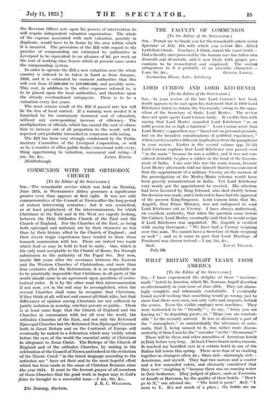LORD CURZON AND LORD KITCHENER
[To the Editor of the SPECTATOR.] SIR,—In your review of the late Lord Curzon's last book doubt appears to be cast upon his statement that in 1910 Lord Kitchener failed to obtain the Viceroyalty owing to the oppo- sition of the Secretary of State, Lord Morley. The review does not quite quote Lord Curzon fairly. It credits him with saying that Lord Morley regarded Lord Kitchener " as an unfit person for so high a function." Lord Curzon wrote that Lord Morley's opposition was " based not on personal grounds, but on the broadest considerations of political expediency," which carries a rather different implication from the paraphrase in your review. Earlier in the second volume (pp. 51-52) Lord Curzon explains that Lord Kitchener was passed over " in the main " because he was a soldier, and it was not con- sidered desirable to place a soldier at the head of the Govern- ment of India. I am sure this was the main reason, because Lord Morley afterwards told me himself that he was convinced that the appointment of a military Viceroy on the morrow of the promulgation of the Morley-Minto reforms would have been gravely misunderstood in India. Yet Lord Kitchener very nearly got the appointment he coveted. His selection had been favoured by King Edward, who died shortly before the decision was made, and is believed to have had the approval of the present King-Emperor. Lord Curzon hints that Mr. Asquith, then Prime Minister, was not indisposed to send Lord Kitchener out as Viceroy. I have always understood, on excellent authority, that when the question came before the Cabinet, Lord Morley eventually said that he would resign if Lord Kitchener was appointed. Mr. Asquith is credited with saying thereupon : " We have had a Viceroy resigning over this man. VVe cannot have a Secretary of State resigning as well " ; and so it came to pass that Lord Hardingc of Penshurst was chosen instead.—I am, Sir, &c.,


























































 Previous page
Previous page